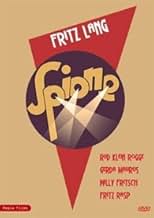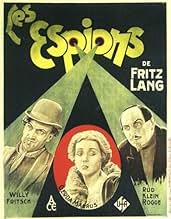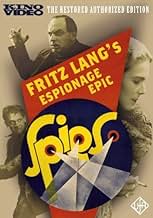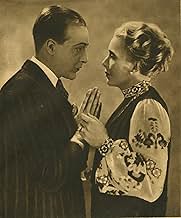NOTE IMDb
7,5/10
4,2 k
MA NOTE
Le cerveau d'une opération d'espionnage omniprésente découvre une romance dangereuse entre une femme russe à son service et un agent fringant des services secrets du gouvernement.Le cerveau d'une opération d'espionnage omniprésente découvre une romance dangereuse entre une femme russe à son service et un agent fringant des services secrets du gouvernement.Le cerveau d'une opération d'espionnage omniprésente découvre une romance dangereuse entre une femme russe à son service et un agent fringant des services secrets du gouvernement.
- Réalisation
- Scénario
- Casting principal
- Récompenses
- 1 nomination au total
Grete Berger
- Unconfirmed Role
- (non crédité)
Julius Falkenstein
- Hotel Manager
- (non crédité)
Heinrich Gotho
- Burton Jason's Other Assistant
- (non crédité)
Heinrich Gretler
- Spy in the Post Office scene
- (non crédité)
Gustl Gstettenbaur
- Boy Who Helps No. 326
- (non crédité)
Georg John
- Locomotive Engineer
- (non crédité)
Theodor Loos
- Handelsminister
- (non crédité)
Klaus Pohl
- Burton Jason's Assistant
- (non crédité)
Avis à la une
Fritz Lang, undeniably one of the greatest and most influential film-makers in all of cinema, is one of my favorites and, from his early work which remains, perhaps, his most important I only had a few of his surviving films still to catch up with. SPIONE was one of them and, now that I've watched it, I can confirm its stature as one of his very best, if relatively little-known.
The film is basically a follow-up to Lang's seminal two-part DR. MABUSE, THE GAMBLER (1922) and, indeed, it's Rudolph Klein-Rogge himself who originated the role of Mabuse who plays the evil crimelord here (called Haghi and who is made-up to resemble Lenin!). SPIONE follows much the same pattern of intrigue, thrills and action; however, the film's narrative structure is not straightforward but rather elliptical and, even though ostensibly dealing with the conflict which may arise were a treaty to fall into the wrong hands, several major plot points are left deliberately obscure (in fact, we never get to know what the treaty actually contains a precursor to Hitchcock's beloved "McGuffin", perhaps or what Haghi's intentions are, once he gets his hands on it!). In this respect, the social conscience so pronounced in the Mabuse diptych coming, as it did, on the heels of Germany's defeat in WWI is largely jettisoned here in favor of romance (between a female spy desired, and being blackmailed, by Haghi and the Secret Service agent who is the mastermind's nemesis), eroticism (the ensnaring of a central political figure by a vamp in Haghi's service) and technical dexterity (ensuring that SPIONE's considerable 2½-hour running-time goes by rapidly and without any longueurs, in my estimation at least, as opposed to the sluggish and rather static Mabuse). It is not inconceivable, therefore, to discern in Lang's fanciful melodrama the germ for all the spy thrillers which followed from Hitchcock to the James Bond extravaganzas and beyond.
As befits a master story-teller like Lang, particularly during this most creative phase of his career, SPIONE is virtually a catalogue of memorable scenes (interestingly enough, the supplementary photo gallery includes shots from sequences that are missing in the main feature!) chief among them a ghostly visitation, a ritual suicide, a train-wreck, a police raid on a bank and a stage performance by a clown; however as opposed to the DVD back-cover, which blatantly spells out its most clever twist in emulation of the film itself, I've refrained from giving too much away about them here
The film is basically a follow-up to Lang's seminal two-part DR. MABUSE, THE GAMBLER (1922) and, indeed, it's Rudolph Klein-Rogge himself who originated the role of Mabuse who plays the evil crimelord here (called Haghi and who is made-up to resemble Lenin!). SPIONE follows much the same pattern of intrigue, thrills and action; however, the film's narrative structure is not straightforward but rather elliptical and, even though ostensibly dealing with the conflict which may arise were a treaty to fall into the wrong hands, several major plot points are left deliberately obscure (in fact, we never get to know what the treaty actually contains a precursor to Hitchcock's beloved "McGuffin", perhaps or what Haghi's intentions are, once he gets his hands on it!). In this respect, the social conscience so pronounced in the Mabuse diptych coming, as it did, on the heels of Germany's defeat in WWI is largely jettisoned here in favor of romance (between a female spy desired, and being blackmailed, by Haghi and the Secret Service agent who is the mastermind's nemesis), eroticism (the ensnaring of a central political figure by a vamp in Haghi's service) and technical dexterity (ensuring that SPIONE's considerable 2½-hour running-time goes by rapidly and without any longueurs, in my estimation at least, as opposed to the sluggish and rather static Mabuse). It is not inconceivable, therefore, to discern in Lang's fanciful melodrama the germ for all the spy thrillers which followed from Hitchcock to the James Bond extravaganzas and beyond.
As befits a master story-teller like Lang, particularly during this most creative phase of his career, SPIONE is virtually a catalogue of memorable scenes (interestingly enough, the supplementary photo gallery includes shots from sequences that are missing in the main feature!) chief among them a ghostly visitation, a ritual suicide, a train-wreck, a police raid on a bank and a stage performance by a clown; however as opposed to the DVD back-cover, which blatantly spells out its most clever twist in emulation of the film itself, I've refrained from giving too much away about them here
What a hoot! As the other comments have pointed out, this movie has everything and then some. The Image DVD furthers this excitement with the use of an Expressionist typeface for the intertitles and punctuation that includes "-!?", "!!", and even at one point, "-!!!" "Spies" offers an almost perfect print with superb music and sound effects. Newbies to silent film will have to adjust to the wild and sometimes bizarre pantomime style of the acting, but give it half a chance and "Spies" will have you on the edge of your seat, even at the 140- minute length. I love Fritz Lang's American films, like "Rancho Notorious" and "Clash by Night"don't miss these if you have the chancebut Lang's German work shows a young director always at the top of his form, full of brilliant ideas and bursting with energy.
The powerful criminal and leader of a spy ring Haghi (Rudolf Klein- Rogge) uses his spies that are infiltrated everywhere including in the secret service in attempts to steal documents from the French Embassy in Shanghai and from the Minister of Trade that is murdered. The press questions and mocks the officials in charge of security of state and the efficient Agent No. 326 a.k.a. the vagrant Hans Pockzerwinski (Willy Fritsch) is summoned by the Secret Service Chief (Craighall Sherry) to investigate the wave of crimes. Agent 326 immediately identifies that his chief's assistant Vincent is a spy that is providing inside information to the evil mastermind that no one knows how looks like. Meanwhile, Haghi saves the scoundrel Hans Morrier (Louis Ralph) from the gallows to serve him. Then Haghi, who is also the general director of the Haghi Bank, blackmails Mrs. Leslane (Hertha von Walther), who is the wife of the powerful Roger Lesland and habitué of an opium den, to get information of the Japanese Secret Treaty. When Haghi assigns his master spy Sonya Baranilkowa (Gerda Maurus) to get closer to the elegant Agent No. 326, they unexpectedly fall in love for each other affecting Haghi's evil scheme. Meanwhile his spy Kitty (Lien Deyers) lures and seduces the reserved and efficient Japanese agent Akira Matsumoto (Lupu Pick) to steal his documents about the recently signed Treaty that may bring war to the world.
"Spies" is a fantastic epic of espionage, romance, seduction and betrayal by Fritz Lang and I dare to say that James Bond stories might have been inspired in this film. I saw "Spies" yesterday in a restored authorized edition of the DVD released by Kino Video, and in the Extras there is the amazing story of the restoration of this film. The 35 mm archives in nitrate throughout the world were very damaged and incomplete, but this complex version was assembled from several copies using the guidance of the copy from Prague that was the most complete and also deteriorated. The result is a film of 143 minutes running time meaning 50 minutes longer than any version previously released. My vote is eight.
Title (Brazil): "Os Espiões" ("The Spies")
"Spies" is a fantastic epic of espionage, romance, seduction and betrayal by Fritz Lang and I dare to say that James Bond stories might have been inspired in this film. I saw "Spies" yesterday in a restored authorized edition of the DVD released by Kino Video, and in the Extras there is the amazing story of the restoration of this film. The 35 mm archives in nitrate throughout the world were very damaged and incomplete, but this complex version was assembled from several copies using the guidance of the copy from Prague that was the most complete and also deteriorated. The result is a film of 143 minutes running time meaning 50 minutes longer than any version previously released. My vote is eight.
Title (Brazil): "Os Espiões" ("The Spies")
"Spies" is much more entertaining than you would expect an old German silent movie to be, and at first, it's hard to say why. The character types are familiar from hundreds of other spy movies: a villain who is bent on world domination and has multiple secret identities, a beautiful blonde who works as a spy for the villain, a dashing enemy agent who falls in love with the female spy. The plot is fairly ludicrous, though it moves along briskly and provides for some great set-pieces, such as an exhilarating chase scene. But despite all the clichés found in "Spies," the movie still feels fresh and vital. You get drawn into the world of the film and accept the clichés, rather than becoming distracted by them.
I'm sure most of the credit for this has to go to the director, Fritz Lang. His films ("Metropolis," "M") often have a very dark world view, but the overall tone of "Spies" is escapist adventure-fantasy. It aims to provoke thrills, not shock or outrage. Lang creates some stunning visual compositions and proves to be a very detail-oriented directorhe delights in close-ups of spy gadgetry! His innovative use of montages, dramatic lighting, camera movement, and other techniques gives the film an interesting stylization.
I'm writing this review after watching the 90-minute American version of "Spies". But I had such a good time that I may have to seek out the 146-minute version!
I'm sure most of the credit for this has to go to the director, Fritz Lang. His films ("Metropolis," "M") often have a very dark world view, but the overall tone of "Spies" is escapist adventure-fantasy. It aims to provoke thrills, not shock or outrage. Lang creates some stunning visual compositions and proves to be a very detail-oriented directorhe delights in close-ups of spy gadgetry! His innovative use of montages, dramatic lighting, camera movement, and other techniques gives the film an interesting stylization.
I'm writing this review after watching the 90-minute American version of "Spies". But I had such a good time that I may have to seek out the 146-minute version!
Fritz Lang was one of the great silent film directors (His talkies are great as well) and this is his best silent film. Agents target the mysterious Haghi (Rudolf Klien-Rogge), a master criminal out to topple the banks of the world. The pursuit includes a seductive young female spy driving a Japanese business man to hari-kiri, assassinations, a chase and a showdown on a train (that collides in one heck of a sequence.) The film concludes with Haghi trapped on a stage where he is dressed as a clown (Why a powerful bank president moonlights as a third rate clown has always puzzled me.) Alfred Hitchcock openly cites this brillaint film as an influence. Also, there is a priceless glimpse of 1920's Germany here- the decadence of Berlin, where apartment dwellers turn their tiny flats into bars for extra cash. Even when the film plays in its complete 3 hour form, it's an exciting time at the movies.
Le saviez-vous
- AnecdotesUFA insisted on the film being made inexpensively, as Fritz Lang's previous film Metropolis (1927) had brought the studio to near bankruptcy. Lang therefore chose to do most of the shots in narrow settings with lots of close-ups, as no big sets had to be built up for that way of filming. Fortunately "Spione" became a huge success.
- GaffesWhen Sonya and Franz (the chauffeur) are tied up and trying to escape, the hand cranking the camera is visible.
- ConnexionsEdited into Fritz Lang, le cercle du destin - Les films allemands (2004)
Meilleurs choix
Connectez-vous pour évaluer et suivre la liste de favoris afin de recevoir des recommandations personnalisées
- How long is Spies?Alimenté par Alexa
Détails
- Durée
- 2h 30min(150 min)
- Couleur
- Mixage
- Rapport de forme
- 1.33 : 1
Contribuer à cette page
Suggérer une modification ou ajouter du contenu manquant




































